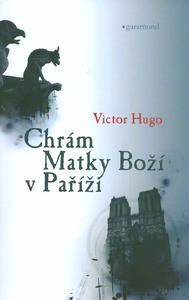Take a photo of a barcode or cover
I really wanted to like this book. Ever since I watched the Disney movie I wanted to read Hugo's original unabridged version. Honestly, although his descriptions of Paris and the people living in the city are beautiful and highly interesting, and the story is way darker and more tragic (in a good way) than the Disney version, the writing is just so... dense. Now, I'm not opposed to dense works, I can work through a certain degree of wordy descriptions and have no problem whatsoever with books that number well over a thousand pages, but this was too much.
"Our reader must excuse us" quickly became the moment for me to flip through the pages until the interesting dialogue and character interactions started again. The recurring descriptions pulled me out of the submersion of the story, making me not care about it nearly as much as I so wanted to. I'm still planning to try out Les Mis, if only because I already own a physical copy, but it's going to be a little while before I do
"Our reader must excuse us" quickly became the moment for me to flip through the pages until the interesting dialogue and character interactions started again. The recurring descriptions pulled me out of the submersion of the story, making me not care about it nearly as much as I so wanted to. I'm still planning to try out Les Mis, if only because I already own a physical copy, but it's going to be a little while before I do
dark
sad
medium-paced
Plot or Character Driven:
A mix
Strong character development:
Complicated
Loveable characters:
Complicated
Diverse cast of characters:
Yes
Flaws of characters a main focus:
Yes
The story is simple and full of coincidences but still very enjoyable. All the characters have depth and are well crafted but perhaps the female protagonist resembles too unrealistically the ideal of the XIX century young woman. Sometimes the frailty of her psyche and her physiognomy are too exasperating for my taste and I wish she had a stronger common sense and character.
dark
mysterious
sad
tense
medium-paced
Plot or Character Driven:
A mix
Strong character development:
No
Loveable characters:
Complicated
Diverse cast of characters:
Yes
Flaws of characters a main focus:
Yes
(4.5)
Although I did skip a few of the chapters that only described the scenery, I enjoyed this more than I thought I would. The ending was simply tragic, but it was completely logical for the story... and I loved it.
Although I did skip a few of the chapters that only described the scenery, I enjoyed this more than I thought I would. The ending was simply tragic, but it was completely logical for the story... and I loved it.
Such a brutal tale of love and loss. Claude Frollo will always remain one of my favourite villains.
dark
mysterious
slow-paced
There are so many excellent reviews of this book that I am reluctant to add one of mine. Unfortunately, due to my poor French abilities, I had to rely to translations of the book. I was surprised that the name was changed from the original French of Notre-Dame de Paris to The Hunchback of Notre-Dame in English, it is evident that Hugo intent was to focus on Paris in general and the Cathedral in particular rather than on the hunchback role.
I didn’t know that this novel spurred an interest into Gothic revival and, later on, the historical preservation and restoration of monuments of national importance under the direction of Eugène Viollet-le-Duc . He is the fellow who led the restoration of the cathedral itself as well as of buildings at Vézelay, Mont Saint-Michel and Carcassonne.
I enjoyed the story very much (much more than the famous Les Misérables, written 30 years later). I liked the fights and struggles amongst and between the social strata: nobility and clergy vs working classes of merchants and populace; even beggars and thieves have important roles in the story.
I also appreciated the complexity of the characters; the Archdeacon is not a typical anti-hero. Frollo’s character starts as compassionate towards Quasimodo and devoted to his brother before he starts venting his frustrations at his failures as a teacher, brother and lover and eventually falling into madness. In my opinion, Esmeralda is not as well developed; she is a charming and exotic beauty but she reveal herself as a typical teen, in love with a romantic ideal of love ("a man and a woman blending into an angel"), but sadly lacking soul.
Quasimodo is the predictable hero, devoted to his beloved Cathedral, his purity balances the obvious deformity. He is a mirror of the evil world and the ugliness of the people that surrounds him. Hugo’s irony shows in the description of how the Parisians enjoy Quasimodo's "singing" while at the same time detest and are repulsed by his ugliness.
At times, I found the story melodramatic (in particular the scene in Sister Gudule’s cell) but mine is probably a modern reaction to the Romantic Movement themes of the novel.
Favourite quote:
Love is like a tree; it grows spontaneously, strikes its roots deep into our whole being, and often continues to flourish over a heart in ruins.
And the inexplicable part of it is, that the blinder this passion, the more tenacious it is. It is never stronger than when it is utterly unreasonable.
I didn’t know that this novel spurred an interest into Gothic revival and, later on, the historical preservation and restoration of monuments of national importance under the direction of Eugène Viollet-le-Duc . He is the fellow who led the restoration of the cathedral itself as well as of buildings at Vézelay, Mont Saint-Michel and Carcassonne.
I enjoyed the story very much (much more than the famous Les Misérables, written 30 years later). I liked the fights and struggles amongst and between the social strata: nobility and clergy vs working classes of merchants and populace; even beggars and thieves have important roles in the story.
I also appreciated the complexity of the characters; the Archdeacon is not a typical anti-hero. Frollo’s character starts as compassionate towards Quasimodo and devoted to his brother before he starts venting his frustrations at his failures as a teacher, brother and lover and eventually falling into madness. In my opinion, Esmeralda is not as well developed; she is a charming and exotic beauty but she reveal herself as a typical teen, in love with a romantic ideal of love ("a man and a woman blending into an angel"), but sadly lacking soul.
Quasimodo is the predictable hero, devoted to his beloved Cathedral, his purity balances the obvious deformity. He is a mirror of the evil world and the ugliness of the people that surrounds him. Hugo’s irony shows in the description of how the Parisians enjoy Quasimodo's "singing" while at the same time detest and are repulsed by his ugliness.
At times, I found the story melodramatic (in particular the scene in Sister Gudule’s cell) but mine is probably a modern reaction to the Romantic Movement themes of the novel.
Favourite quote:
Love is like a tree; it grows spontaneously, strikes its roots deep into our whole being, and often continues to flourish over a heart in ruins.
And the inexplicable part of it is, that the blinder this passion, the more tenacious it is. It is never stronger than when it is utterly unreasonable.
challenging
dark
sad
slow-paced




